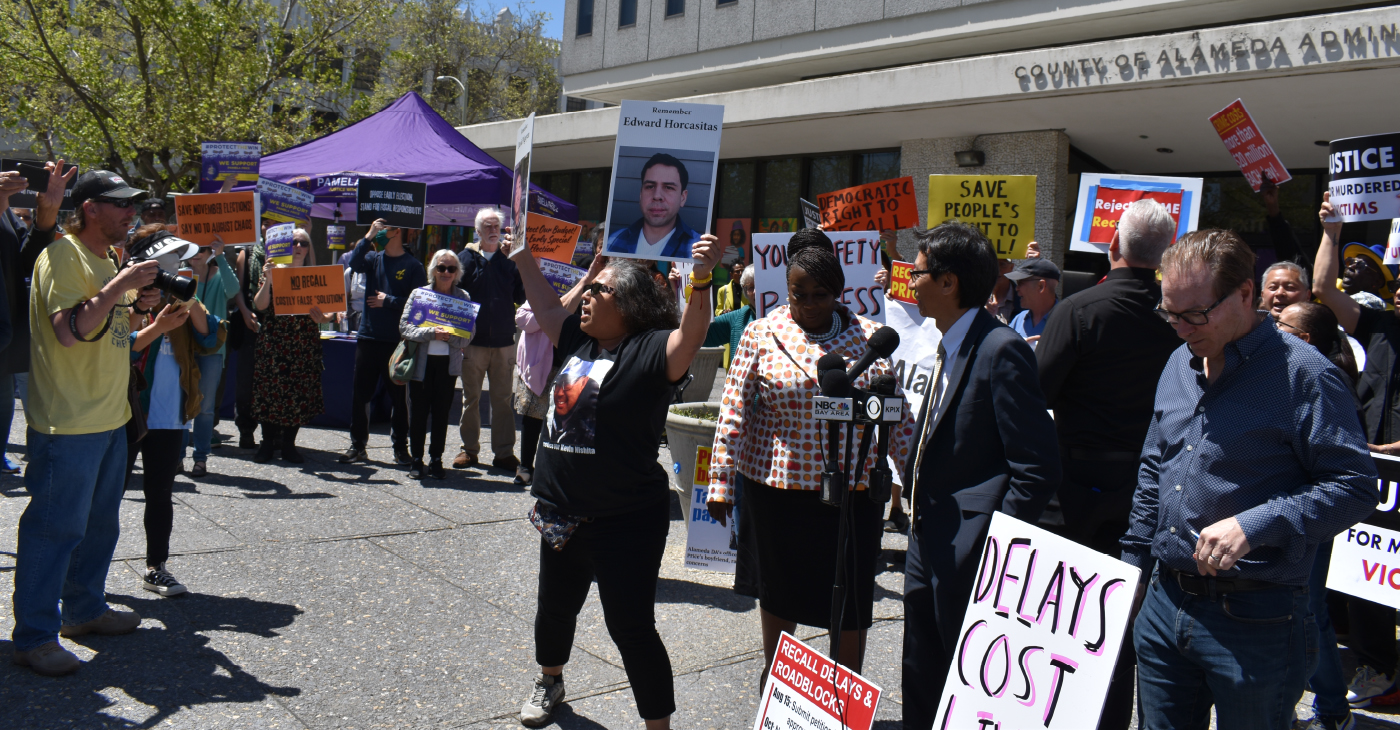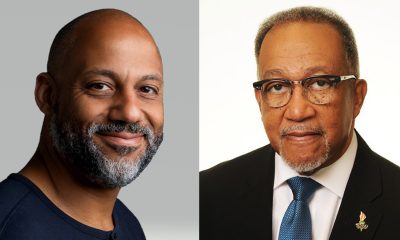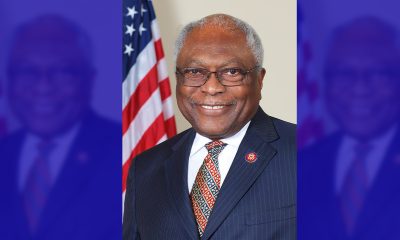Politics
Bush, Rubio, Bring Spanish Fluency to 2016 Campaign

In this April 28, 2015, photo, Republican presidential hopeful Sen. Marco Rubio, R-Fla., speaks at an event organized by Town Hall Los Angeles in Los Angeles. Republicans are bringing something unique to the 2016 presidential campaign: an ability to speak to Americans in both of their main mother tongues, Spanish as well as English. It remains to be seen how much Jeb Bush and Rubio will use their fluent Spanish in the campaign. (AP Photo/Jae C. Hong)
WILL WEISSERT, Associated Press
CALVIN WOODWARD, Associated Press
AUSTIN, Texas (AP) — Republicans are bringing something unique to the 2016 presidential campaign: an ability to speak to Americans in both of their main mother tongues, Spanish as well as English.
Democrats can’t match it. Previous GOP candidates couldn’t.
But now, paradoxically, the party that’s on the outs with many Hispanic voters over immigration is the party that has serious presidential candidates who are surefooted in their language.
It remains to be seen how much Jeb Bush and Marco Rubio will use their fluent Spanish in the campaign. Rubio offered a few words of it in his presidential campaign announcement, quoting his Cuban grandfather, a small but notable addition in a speech meant for everyone to hear, not just a Hispanic crowd.
Bush peppered his remarks with Spanish in Puerto Rico on Tuesday, making an obvious cultural connection with many in his audience.
Even a modest amount of Spanish will be more than presidential campaigns have known.
President George W. Bush rarely used his barely high school-level Spanish and, when he did, it was a token nod, not a real conversation. President Barack Obama and 2016 Democratic presidential contender Hillary Rodham Clinton have gamely tried a few lines now and then.
Bilingualism is a tricky issue in politics and you can be sure that careful calculations are being made on how and when to display it in the Bush and Rubio campaigns.
Bush the former governor and Rubio the senator have spoken Spanish liberally in Florida politics and other settings. But this is a national campaign for the highest office.
Republicans, on the one hand, want to win over Hispanic voters. On the other, they want to avoid upsetting some traditional supporters who — whether because of immigration concerns, nativism or simple cultural tradition — want English only.
A second Hispanic-American in the Republican race, Texas Sen. Ted Cruz, has largely lost the language of his Cuban-born father and calls his Spanish “lousy.” (Another contender, former Texas Gov. Rick Perry, also is not fluent.)
Should Bush or Rubio go on to win the nomination, and should Clinton take the Democratic prize, history is sure to be made in 2016. After having elected the first black president, Americans would now be putting either the first fluent Spanish-speaker, or the first woman, in the presidency.
HOW MUCH DOES LANGUAGE MATTER?
No one thinks speaking Spanish is an easy ticket to Hispanic votes. Especially for Republicans, who saw Obama take 71 percent of the Hispanic vote in 2012.
But it’s a sign of respect, says Bob Quasius, founder of Cafe Con Leche Republicans, which presses for the Republican Party to become more inclusive of Hispanics. “Even if your Spanish isn’t very good, it’s welcome.”
Hispanic turnout has increased in every election for nearly three decades, meaning it may top 10 percent of the electorate in 2016, according to Mark Hugo Lopez, director of Hispanic Research at the Pew Research Center. Even so, among registered Hispanic voters, 83 percent prefer English or are bilingual, Pew has found. Only 17 percent identify Spanish as their dominant language. Spanish is much more heavily preferred among Latinos who are not registered to vote.
“If a candidate can speak Spanish, it could at least get Hispanics interested,” Lopez said. “But it’s not going to be the deciding factor.”
___
RUBIO
The son of Cuban immigrants, Rubio hails from heavily Hispanic West Miami and grew up bilingual. He shifts comfortably between the two languages while running Senate meetings, appearing at news conferences and interacting with people.
Rubio delivered two versions of the 2013 Republican response to Obama’s State of the Union, in English and Spanish. As a Senate candidate, he used both languages with South Florida crowds.
Al Cardenas, former head of the Florida Republican Party, remembers Rubio firing up volunteers in the two languages while working for Bob Dole’s unsuccessful 1996 White House run.
“He was then, and he is now, just as comfortable doing that in one language as the other,” Cardenas said.
It’s too early to know how much Rubio will do that outside of Hispanic-heavy events in the presidential campaign. When he spoke about his grandfather to Iowa social conservatives on the weekend, he did not use Spanish.
___
BUSH
Bush speaks Spanish at home with his Mexican-born wife, Columba, and whenever he encounters people who approach him in that language. Like Rubio, he clearly wants to draw more Latinos behind his effort, and he can be expected to address a variety of Hispanic functions, as he was doing Wednesday in Houston.
He earned thunderous applause in Puerto Rico at events where he mixed English with effortless Spanish.
“I love it,” said Maria Elena Cruz, a 59-year-old government worker from Toa Baja. “He speaks Spanish just like us.”
“That makes us feel good,” said Paola Bazzano, 72, a doctor’s assistant. “It’s a way to establish good rapport.”
How far he will go with his bilingualism, though, is not yet apparent.
His speech announcing his candidacy, whenever it comes, will offer a clue as to what he will do when speaking to a national audience. Will he say a few words of Spanish, like Rubio? Make a bolder statement, with even more?
___
CRUZ
Cruz is the first Hispanic senator from Texas, where many residents are native Spanish speakers. He struggles with the language, however, and nixed a proposal for a debate in Spanish in his 2012 Senate campaign.
“Like many second-generation Hispanic immigrants, he is conversational, though not fluent in Spanish,” Cruz spokeswoman Catherine Frazier said. “But that will not hinder his efforts to build a robust Hispanic outreach operation.”
___
Associated Press writer Danica Coto contributed to this report from San Juan, Puerto Rico. Woodward reported from Washington.
Copyright 2015 The Associated Press. All rights reserved. This material may not be published, broadcast, rewritten or redistributed.
Activism
S.F. Black Leaders Rally to Protest, Discuss ‘Epidemic’ of Racial Slurs Against Black Students in SF Public School System
Parents at the meeting spoke of their children as no longer feeling safe in school because of bullying and discrimination. Parents also said that reported incidents such as racial slurs and intimidation are not dealt with to their satisfaction and feel ignored.

By Carla Thomas
San Francisco’s Third Baptist Church hosted a rally and meeting Sunday to discuss hatred toward African American students of the San Francisco Unified School District (SFUSD).
Rev. Amos C. Brown, president of the San Francisco NAACP and pastor of Third Baptist Church, along with leadership from local civil rights groups, the city’s faith-based community and Black community leadership convened at the church.
“There has been an epidemic of racial slurs and mistreatment of Black children in our public schools in the city,” said Brown. “This will not be tolerated.”
According to civil rights advocate Mattie Scott, students from elementary to high school have reported an extraordinary amount of racial slurs directed at them.
“There is a surge of overt racism in the schools, and our children should not be subjected to this,” said Scott. “Students are in school to learn, develop, and grow, not be hated on,” said Scott. “The parents of the children feel they have not received the support necessary to protect their children.”
Attendees were briefed last Friday in a meeting with SFUSD Superintendent Dr. Matt Wayne.
SFUSD states that their policies protect children and they are not at liberty to publicly discuss the issues to protect the children’s privacy.
Parents at the meeting spoke of their children as no longer feeling safe in school because of bullying and discrimination. Parents also said that reported incidents such as racial slurs and intimidation are not dealt with to their satisfaction and feel ignored.
Some parents said they have removed their students from school while other parents and community leaders called on the removal of the SFUSD superintendent, the firing of certain school principals and the need for more supportive school board members.
Community advocates discussed boycotting the schools and creating Freedom Schools led by Black leaders and educators, reassuring parents that their child’s wellbeing and education are the highest priority and youth are not to be disrupted by racism or policies that don’t support them.
Virginia Marshall, chair of the San Francisco NAACP’s education committee, offered encouragement to the parents and students in attendance while also announcing an upcoming May 14 school board meeting to demand accountability over their mistreatment.
“I’m urging anyone that cares about our students to pack the May 14 school board meeting,” said Marshall.
This resource was supported in whole or in part by funding provided by the State of California, administered by the California State Library via California Black Media as part of the Stop the Hate Program. The program is supported by partnership with California Department of Social Services and the California Commission on Asian and Pacific Islander American Affairs as part of the Stop the Hate program. To report a hate incident or hate crime and get support, go to CA vs Hate.
Alameda County
Board of Supervisors Accepts Certification of Signatures, Will Schedule Recall Election May 14
The Alameda Board of Supervisors unanimously accepted the certification of the results of the valid signatures submitted for the recall of District Attorney Pamela Price on Tuesday evening. The Board will set the election date at a special meeting on May 14. Before the meeting, recall proponents and opponents held separate press conferences to plead their cases to the Board and residents of Alameda County.

By Magaly Muñoz
The Alameda Board of Supervisors unanimously accepted the certification of the results of the valid signatures submitted for the recall of District Attorney Pamela Price on Tuesday evening. The Board will set the election date at a special meeting on May 14.
Before the meeting, recall proponents and opponents held separate press conferences to plead their cases to the Board and residents of Alameda County.
Price, who up until this point has made little public comment about the recall, held her press conference in Jack London to announce that the California Fair Political Practices Commission has opened an investigation into the finances of the Save Alameda For Everyone (SAFE) recall campaign.
The political action committee (PAC), Reviving the Bay Area, has been the largest contributor to the SAFE organization and has allegedly donated over half a million dollars to the recall efforts.
“Between September 2023 and November 2023, [Revive the Bay Area] donated approximately $578,000 to SAFE without complying with the laws that govern all political committees in California,” Price said.
Price accused the recall campaigns of using irregular signature-gathering processes, such as paying gatherers per signature, and using misleading information to get people to sign their petitions.
SAFE held their own press conference outside of the Alameda County Administration Building at 1221 Oak St. in Oakland, once again calling for the Board to certify their signatures and set a date for the recall election.
Their press conference turned contentious quickly as Price’s “Protect the Win” supporters attempted to yell over the SAFE staff and volunteers. “Stop scapegoating Price” and “Recall Price” chants went on for several moments at a time during this event.
Families of victims urged the Board to think of their loved ones whose lives are worth much more than the millions of dollars that many opponents of the recall say is too much to spend on a special election.
The Registrar of Voters (ROV) estimates the special election could cost anywhere from $15 to $20 million, an amount that is not in their budget.
The Board was presented with several options on when and how to conduct the recall election. They have to set a date no less than 88 days or more than 125 days after May 14, meaning the date could fall anywhere from late July to September.
But the County charter also states that if a general election takes place within 180 days of their scheduling deadline, the Board could choose to use the November ballot as a way to consolidate the two events.
In the event that Price is recalled, the Supervisors would appoint someone to fill the vacancy, though neither the County nor the California charter specifies how long they would have to pick a replacement.
The appointee would serve as district attorney spot until the next election in 2026. Afterwards, either they, if they run and win, or a newly elected candidate would serve the rest of Price’s six-year term until 2029. Price is unique as the only district attorney wo serves a term of six years.
The Board acknowledged that they knew last fall that this recall would come with its own set of complications when Measure B, which changed the local recall charter to match California’s, was first brought to their consideration.
Supervisors Nate Miley and David Haubert opposed discussing the measure, stating that the public would think that the Board was attempting to influence the recall campaign that had already taken off months prior.
“I think ultimately this feels like it’s going to end up in court, one way or the other, depending on who files what,” Haubert said.
Price’s legal team told the Post that the district attorney intended to consider all legal options should the recall election take place.
Miley stated that while he was in support of the amendment to the charter, he did not think it was right to schedule it for the March ballot as it would ultimately cause confusion for everyone involved.
“It has produced some legal entanglements that I think, potentially, could’ve been avoided,” Miley said.
Commentary
Opinion: Lessons for Current Student Protesters From a San Francisco State Strike Veteran
How the nation’s first College of Ethnic studies came about, bringing together Latino, African American and Asian American disciplines may offer some clues as to how to ease the current turmoil on American college campuses over the Israel-Hamas war. After the deadline passed to end the Columbia University encampment by 2 p.m. Monday, student protesters blockaded and occupied Hamilton Hall in a symbolic move early Tuesday morning. Protesters did the same in 1968.

By Emil Guillermo
How the nation’s first College of Ethnic studies came about, bringing together Latino, African American and Asian American disciplines may offer some clues as to how to ease the current turmoil on American college campuses over the Israel-Hamas war.
After the deadline passed to end the Columbia University encampment by 2 p.m. Monday, student protesters blockaded and occupied Hamilton Hall in a symbolic move early Tuesday morning.
Protesters did the same in 1968.
That made me think of San Francisco State University, 1968.
The news was filled with call backs to practically every student protest in the past six decades as arrests mounted into hundreds on nearly two dozen campuses around the country.
In 1970, the protests at Kent State were over the Vietnam War. Ohio National Guardsmen came in, opened fire, and killed four students.
Less than two weeks later that year, civil rights activists outside a dormitory at Jackson State were confronted by armed police. Two African American students were killed, twelve injured.
But again, I didn’t hear anyone mention San Francisco State University, 1968.
That protest addressed all the issues of the day and more. The student strike at SFSU was against the Vietnam war.
That final goal was eventually achieved, but there was violence, sparked mostly by “outside agitators,” who were confronted by police.
“People used the term ‘off the pigs’ but it was more rally rhetoric than a call to action (to actually kill police),” said Daniel Phil Gonzales, who was one of the strikers in 1968.
Gonzales, known as the go-to resource among Filipino American scholars for decades, went on to teach at what was the positive outcome of the strike, San Francisco State University’s College of Ethnic Studies. It’s believed to be the first of its kind in the nation. Gonzales recently retired after more than 50 years as professor.
As for today’s protests, Gonzales is dismayed that the students have constantly dealt with charges of antisemitism.
“It stymies conversation and encourages further polarization and the possibility of violent confrontation,” he said. “You’re going to be labeled pro-Hamas or pro-terrorist.”
That’s happening now. But we forget we are dealing not with Hamas proxies. We are dealing with students.
Gonzales said that was a key lesson at SF State’s strike. The main coalition driving the strike was aided by self-policing from inside of the movement. “That’s very difficult to maintain. Once you start this kind of activity, you don’t know who’s going to join,” he said.
Gonzales believes that in the current situation, there is a patch of humanity, common ground, where one can be both pro-Palestine and pro-Israel. He said it’s made difficult if you stand against the belligerent policies of Benjamin Netanyahu. In that case, you’re likely to be labeled antisemitic.
Despite that, Gonzales is in solidarity with the protesters and the people of Gaza, generally. Not Hamas. And he sees how most of the young people protesting are in shock at what he called the “duration of the absolute inhumane kind of persecution and prosecution of the Palestinians carried out by the Israeli government.”
As a survivor of campus protest decades ago, Gonzales offered some advice to the student protesters of 2024.
“You have to have a definable goal, but right now the path to that goal is unclear,” he said.
About the Author
Emil Guillermo is a journalist and commentator. A veteran newsman in TV and print, he is a former host of NPR’s “All Things Considered.”
-

 Community3 weeks ago
Community3 weeks agoFinancial Assistance Bill for Descendants of Enslaved Persons to Help Them Purchase, Own, or Maintain a Home
-

 Business3 weeks ago
Business3 weeks agoV.P. Kamala Harris: Americans With Criminal Records Will Soon Be Eligible for SBA Loans
-

 Activism4 weeks ago
Activism4 weeks agoOakland Post: Week of April 10 – 16, 2024
-

 Community3 weeks ago
Community3 weeks agoAG Bonta Says Oakland School Leaders Should Comply with State Laws to Avoid ‘Disparate Harm’ When Closing or Merging Schools
-

 Activism2 weeks ago
Activism2 weeks agoOakland Post: Week of April 24 – 30, 2024
-

 City Government3 days ago
City Government3 days agoCourt Throws Out Law That Allowed Californians to Build Duplexes, Triplexes and RDUs on Their Properties
-

 Community2 weeks ago
Community2 weeks agoRichmond Nonprofit Helps Ex-Felons Get Back on Their Feet
-

 Community2 weeks ago
Community2 weeks agoOakland WNBA Player to be Inducted Into Hall of Fame
























































